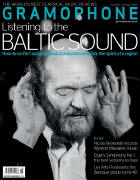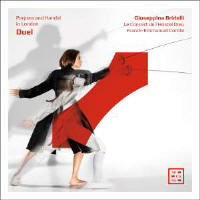Texte paru dans: / Appeared in: |
|
|
Outil de traduction (Très approximatif) |
|
|
Reviewer: David Vickers The existence of two competing Italian opera companies in London during the mid-1730s is a story that is sometimes told with more fantasy than sense. With input (and an erudite booklet note) from musicologist Stefano Aresi, Giuseppina Bridelli presents the concept of a duel – rounded off by witty artwork showing her fencing with her sister. Numerically, Porpora appears to win the duel (seven selections), but Handel more than holds his own with Ruggiero’s ‘Sta nell’ircana pietrosa tana’ (the horns and oboes are too receded, although the bustling strings and polished heroic singing are marvellous), and Ariodante’s heartbroken ‘Scherza infida’ is played and conducted as beautifully as any other performance I can remember; Bridelli eloquently sings anonymous 18th-century embellish-ments preserved in the Royal Academy of Music library. The ballet contrasting agreeable and disagreeable dreams (not used by Handel in Ariodante but instead reserved for Alcina) is played elegantly by Le Concert de l’Hostel Dieu. Harpsichordist Franck-Emmanuel Comte directs the Porpora selections with an affinity for detailed textures. Among the most fascinating is David’s rooftop ogling of Bathsheba in the extraordinary accompanied recitative (‘Dolce è su queste alte mie logge a sera’, with six-part muted strings) that leads into the simpler yet rapturous aria ‘Fu del braccio omnipotente’ (David e Bersabea). Bridelli’s vocal agility impresses in florid music written for Farinelli (Achille’s ‘A questa man verrà’ from Ifigenia in Aulide), and she is equally adept at sweeter charm in music composed in a slightly lower tessitura for Senesino (Teseo’s ‘Nume che reggi ’l mare’ from Arianna in Naxo and ‘Alza al soglio i guardi’ from Mitridate). Such a mutually appreciative juxtaposition of both composers’ directly contemporary works for London is long overdue and musically enriching. However, the double-whammy climax is a clever twist – earlier music by each composer that his counterpart certainly knew. Apparently Porpora had a copy of Handel’s Tolomeo (Bridelli and the orchestra give a taut account of the hero’s succumbing to poison in ‘Stille amare’), whereas Handel included Porpora’s animated ‘Quando piomba improvvisa saetta’ (from Poro) in his pasticcio Catone in Utica. |
|




